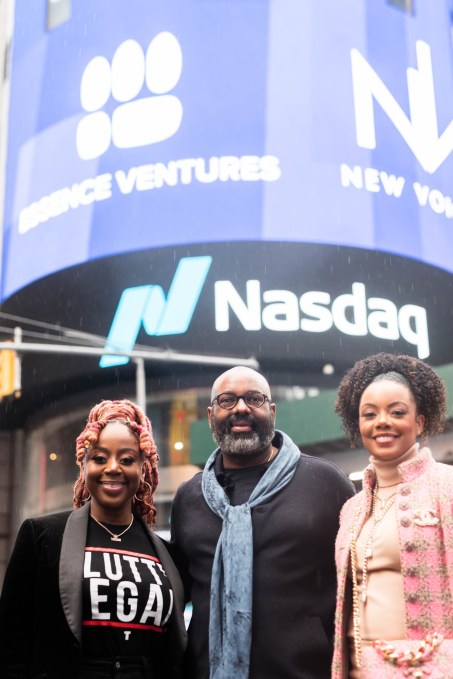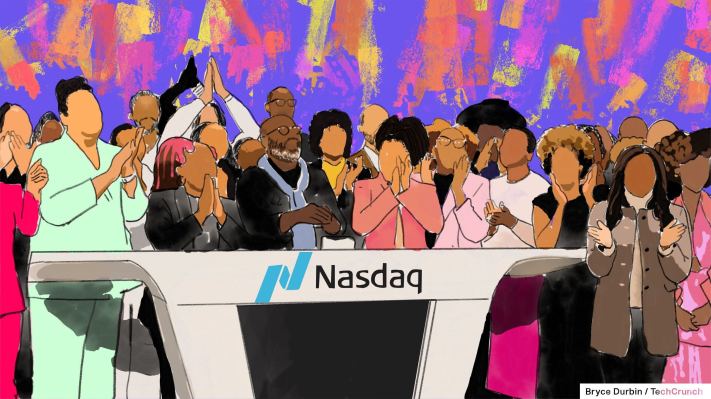Nasdaq on Friday hosted the New Voices Foundation and Essence Ventures, inviting some of the most prominent Black professionals within the venture and startup space behind the podium to help open the markets.
Though this isn’t the first time Nasdaq has honored Black History Month, some who were there commented that “history was made.” And indeed, this opening bell felt different. Shila Nieves Burney, the founder of Zane Capital, told TechCrunch that the day felt like all of the Black ancestors were looking down on them and saying, “Great work.” “We rang the bell for Zane and for all the other Black and brown people who built Wall Street but were denied access to the wealth.”
For investor Tiana Tukes, the experience felt bigger than just ringing the bell. “On the surface, Friday’s ceremony was about opening the Nasdaq, but for us, the experience symbolized the opening of doors for generations now and to come,” she told TechCrunch. “As the bell tolled, I imagined someone, somewhere, who looked like us, heard its call and knew they’d one day be next, and we’d be cheering for them.”
Nasdaq’s event during Black History Month was titled “Our Wealth: Moving Black Businesses Forward” and consisted of networking and panel discussions, celebrating the past, present and future of Black entrepreneurship with a star-studded guest list that included companies such as The Lip Bar, BlackRock and JPMorgan. Cleo Capital founder Sarah Kunst was there, as was Beatrice Dixon, the founder of The Honey Pot Company.
Essence Ventures and the New Voices Foundation founder Richelieu Dennis rang the actual bell alongside Slutty Vegan founder Pinky Cole and Mielle Organics founder Monique Rodriguez. Speaking to TechCrunch, Rodriguez said the moment felt like the Black and brown trailblazers who fought for equality were proudly looking down.
“The Black community needs to continue to see this,” she said, referring to having more examples of Black economic triumph. “We have to normalize this because we deserve success.”
Dennis added to that, saying that events, such as the one hosted with Nasdaq, are part of his mission in providing resources to founders who are disrupting industries, as well as spurring generational wealth. “We didn’t come to Nasdaq as one company or as individuals,” he told TechCrunch. “We came here as an ecosystem, and we’re going to continue building in that way.”
TechCrunch moderated a panel with Cole, Dixon, Rodriguez and founder Devo Harris about their roads to success., which can be watched HERE. Nasdaq Chief Digital Officer Sehr Thadhani also hosted a panel discussion, hers about building a business.

Pinky Cole (L), Richelieu Dennis (C) and Monique Rodriguez (R). Image Credits: Geraldine Jeannot
She told TechCrunch that ringing the opening bell with Essence Ventures and the New Voices Foundation was “monumental” for Nasdaq and that it was proud to provide a platform to support Black and brown businesses.
“It was clear that everyone at the event shared the same mission: to achieve impact by creating space for a network of founders and investors that don’t always have a voice in the room or a seat at the table,” she said.
Kelli Jones, the co-founder of Sixty8 Capital, said she was honored to attend such a “monumental event,” especially since it’s not too often that opportunities like this come to the Black community. “You can’t deny the greatness and the Black history that was happening in that room, at that time, at that moment,” she told TechCrunch. “It honestly still gives me chills.”
Among the topics covered was the general fear that many Black people have about what happens after a Black-owned company gets acquired. For example, people often worry about the changing of ingredients in Black-owned products after a sale, concerned that those products might not work for their hair textures anymore. Rodriguez announced earlier this year that she sold her company to Procter & Gamble for an undisclosed amount and will remain CEO. She said on the panel if there was a Black beauty conglomerate that existed to buy her company, then she and other Black beauty founders would’ve gone that route.
The “partnership,” as she called it, with P&G gave Rogriguez the capital to fund more Black entrepreneurs. Many Black founders want to invest in other Black-owned businesses eventually; last year, Black founders raised an estimated 1% of the around $215.9 billion in venture capital allocated to startups in the U.S., on par with what such founders have in the past two decades.
Black-owned businesses were also hit hard during the pandemic, and many are lagging toward recovery. The panelists all agreed that mergers and acquisitions are also an important part of building Black wealth and businesses.
As part of Mielle’s acquisition, P&G and Mielle committed $10 million to Rodriguez’s nonprofit Mielle Cares, which provides opportunities and resources to enrich Black and brown communities.
Though Friday’s event celebrated the work of Black entrepreneurs, there’s more that needs to be done, said Zane Capital’s Burney. “Ringing the bell was our way of saying let freedom ring for people who have been marginalized and denied access to America’s great wealth for generations. Ringing the bell symbolizes we are here to claim our share,” she said. “We’ve come a long way, but we still have a long way to go.”
Or, as one person in the audience put it, “the revolution will be financed.”
This article was updated to add quotes by Richelieu Dennis, Pinky Cole, and Sehr Thadhani.
